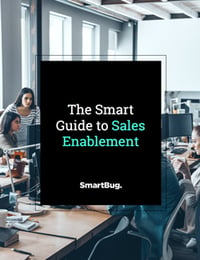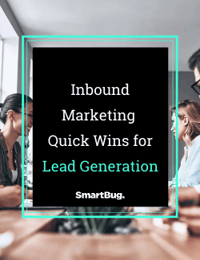
By Jen Spencer
In today's fast-paced marketing landscape, lead generation plays a crucial role in any business’s success. As companies strive to expand their customer base and increase sales, the idea of purchasing lead lists may appear enticing. However, it is essential to recognize the potential pitfalls that come with this approach.
Though it may seem like a quick solution to acquiring leads, the truth is that purchasing lead lists can have detrimental effects on your business. In this article, we’ll delve into the reasons why relying on purchased lead lists can do more harm than good and why it's vital to prioritize organic lead generation strategies.
The Risk of Quantity over Quality
One of the primary reasons why businesses are drawn to purchasing lead lists is the allure of instant access to a vast database of potential customers. After all, more leads mean more opportunities for conversions and sales. The idea of skipping the time-consuming process of building a customer base from scratch can seem like a shortcut to success.
However, it is important to remember that quantity doesn’t always mean quality. Every business dreams of a high volume of leads—but not at the cost of a significant negative impact on conversion rates. Without proper vetting to ensure relevance and quality, a long list of leads can turn into a wasted investment, leading to low conversion rates and ineffective marketing efforts.
Purchased leads may not have a genuine interest in the products or services offered by a business. When marketing efforts target a disinterested audience, the chances of converting them into paying customers diminish greatly. This can result in wasted resources, time, and money spent on campaigns that yield poor returns.
Ultimately, focusing on quality leads generated through organic methods allows businesses to target individuals who are genuinely interested in their offerings, resulting in higher conversion rates and more successful marketing endeavors.
Let’s discuss three major implications that buying lead lists can have on your business:
1. Legal Issues
In many jurisdictions, such practices can violate data protection and privacy laws. Purchasing lead lists without obtaining explicit consent from individuals to use their personal information for marketing purposes can result in severe consequences, including hefty fines and damage to a company's reputation. Businesses must comply with relevant regulations, such as the General Data Protection Regulation (GDPR) in the European Union or the California Consumer Privacy Act (CCPA) in the United States.
Violating privacy regulations such as the General Data Protection Regulation (GDPR) or the CAN-SPAM Act can pose significant risks for businesses. Noncompliance with these regulations can result in severe financial penalties, legal consequences, and reputational damage. When buying lead lists, businesses must make sure the proper consent has been obtained from individuals for their personal information to be used for marketing purposes. Failure to do so can lead to complaints, investigations, and potential lawsuits.
Additionally, violating privacy regulations undermines customer trust and loyalty, damaging the brand's reputation and potentially leading to loss of business. Businesses need to understand and adhere to these privacy regulations when purchasing lead lists to avoid these risks and maintain a strong and ethical marketing approach.
By prioritizing lawful and ethical methods of lead generation, businesses can safeguard themselves against legal troubles, build trust with their audience, and ensure the protection of individuals' personal information.
2. Lack of Targeted Audience
A purchased lead list may contain a large number of contacts, but there’s no guarantee that these individuals are genuinely interested in the products or services offered. As a result, businesses may end up wasting time and resources on reaching out to leads who have no relevance or intent to engage. This lack of targeting can lead to poor conversion rates and low return on investment.
In contrast, organic lead generation methods allow businesses to attract and engage with a more specific and qualified audience.
3. Damage to Brand Reputation
When businesses purchase a lead list, they have little control over the source and quality of the data included. Lead lists are often compiled from multiple sources, and the accuracy and reliability of the data can vary greatly. In many cases, the information may be incomplete and include incorrect or outdated contact details.
Poor data quality might sound like a minor inconvenience, but relying on that data can have major negative consequences. If your sales and marketing teams trust a list of purchased leads, they could end up contacting individuals who never consented to receive communications, resulting in spam complaints and negative feedback. In addition, if you target individuals who are no longer interested or relevant, those people could get frustrated and tell others about their negative experience with your brand. To protect their reputation, businesses should focus on building an organic and engaged audience through ethical marketing practices, nurturing genuine connections, and delivering value to their target audience.
The Value of Organic Lead Generation
Quality leads generated through organic methods yield better results for businesses than those obtained the easy way. Unlike purchasing lead lists, organic lead generation involves attracting potential customers who have shown genuine interest in a company's products or services. Because of this interest, your outreach will feel more like a reciprocal conversation than a cold call, so these leads are likely to be receptive to marketing efforts and have a high probability of converting into paying customers.
By employing strategies such as content marketing, search engine optimization, social media engagement, and email marketing, businesses can establish a strong online presence and build trust with their target audience. This approach not only generates leads who are more likely to convert but also fosters long-term customer relationships, leading to repeat business and positive brand advocacy. Focusing on quality over quantity allows businesses to optimize their resources and drive better results in terms of sales, customer satisfaction, and overall business growth.
Avoid the Lead List Temptation
Buying a lead list can be very tempting, especially in a competitive landscape where quick wins are hard to come by. However, my recommendation is to avoid the temptation at all costs and instead prioritize building quality leads through organic methods. It will require more effort, but the payoff will be well worth it.
By focusing on organic lead generation strategies such as content marketing, social media engagement, and opt-in strategies, businesses can attract and nurture a relevant and engaged audience. This approach not only increases the chances of converting leads into loyal customers but also helps build a strong brand reputation based on trust and authenticity. Investing time and effort into organic lead generation is a long-term strategy that will foster meaningful connections and set your business up for sustainable growth and success.
Don’t know where to start? We’ve got you. Dig into one of our most popular guides around lead generation: Inbound Marketing Quick Wins Guide for Lead Generation.

About the author
Jen Spencer formerly oversaw all operations, executing on SmartBug's growth and market expansion strategy, which is focused on delivering superior, cutting-edge service to the company's customers and partners while continuing to invest in the people and culture that make SmartBug® a great place for employees to work and develop their careers. Read more articles by Jen Spencer.










